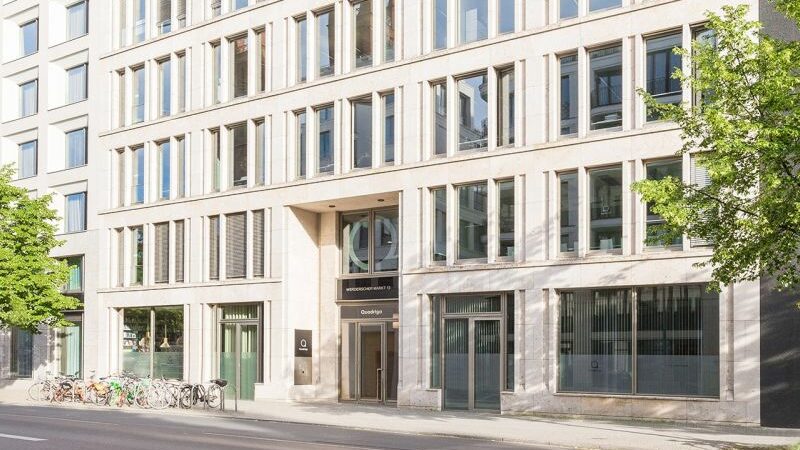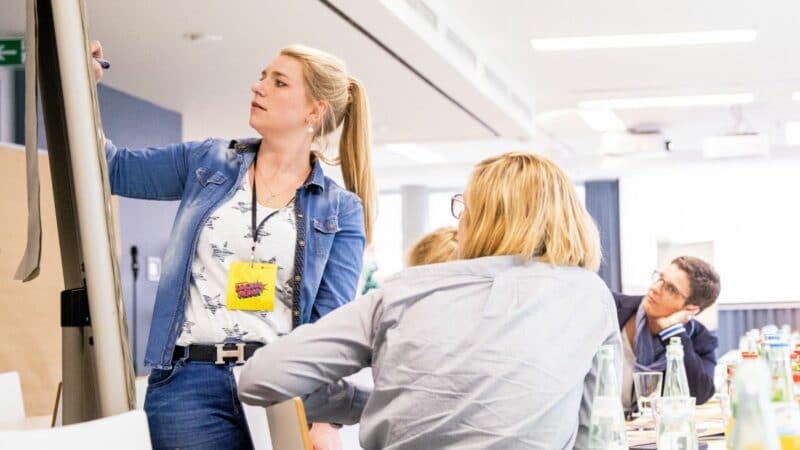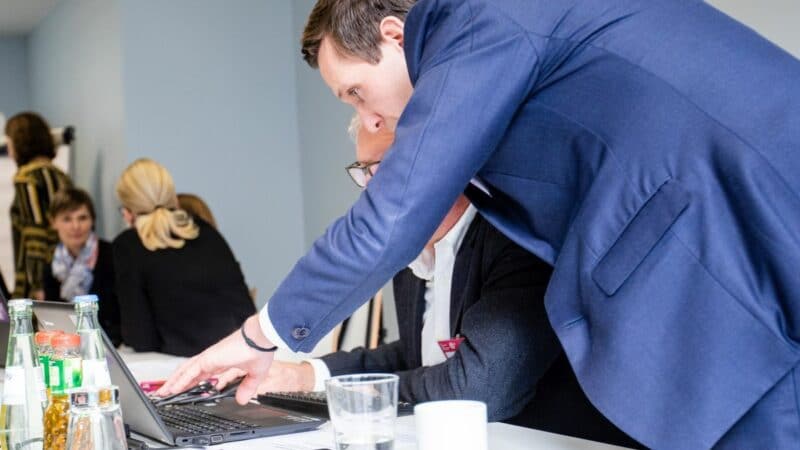Die Deutsche Presseakademie
erstklassige Weiterbildung für Kommunikation und PR, Public Affairs, Leadership und digitalen Wandel.
Wie können wir Sie unterstützen?
Konferenz-Highlight im Mai
Corporate Influencer Day
Corporate Influencer sind das Erfolgsrezept für glaubwürdige Unternehmenskommunikation nach innen und nach außen. Denn sie sind unverstellt, nahbar, mutig. Beim #CID24 am 15. Mai in Berlin erfährst du alles, was du für ein erfolgreiches Botschafter:innenprogramm wissen musst.
Konferenz-Highlight im Juni
Move-Konferenz
Nicht nur reden, sondern machen. Auf der Konferenz für Nachhaltigkeitskommunikation MOVE am 4. und 5. Juni in Berlin lernen Sie, wie Sie Ihr Engagement für Nachhaltigkeit auch über Berichtspflichten hinaus strategisch, transparent und glaubwürdig kommunizieren.
Neues Online-Seminar
ChatGPT für PR & Kommunikation nutzen
Sie möchten lernen, ChatGPT effektiv für professionelle Kommunikation einzusetzen? Dann melden Sie sich jetzt für unser neues Online-Seminar "ChatGPT für PR & Kommunikation nutzen" mit KI-Experte Matthias Biebl an.
Medienarbeit und PR-Skills
Kommunikationsstrategie und ‑management
Nachhaltigkeitskommunikation
Social Media Management
Interne Kommunikation
Videos, Images & Podcasts
Marketing Management
Leadership & Management-Kompetenzen
Public Affairs
Verhandlungsführung

Die Deutsche Presseakademie depak unterstützt Kommunikationsverantwortliche in Unternehmen, Institutionen, Verbänden und Agenturen, die sich für ihre berufliche Zukunft weiterbilden möchten.
Unsere Seminare und Online-Seminare, E-Learning-Kurse, Zertifikats-Lehrgänge und Konferenzen bieten auf höchstem inhaltlichem Niveau ein breites Themenspektrum für alle, die den digitalen Wandel und die weitere Professionalisierung nicht nur miterleben wollen – sondern mitgestalten.
Medienarbeit und PR-Skills
Präzise schreiben und wirkungsvoll sprechen. Mit unseren Seminaren und E-Learnings lernen Sie die Grundlagen für einen sicheren Auftritt, treffende Statements und knackige Texte.
Kommunikationsstrategie und ‑management
Gute Kommunikation bedarf sorgfältiger Planung. Mit den Kursen der depak schaffen Sie die nötigen Rahmenbedingungen, lernen Strategien zu entwickeln und passende Strukturen aufzubauen, um so Ihre Kommunikationsziele zu erreichen.
Social Media Management
Für Unternehmenskommunikation und Marketing gibt es keinen direkteren und schnelleren Wege als die sozialen Medien. Unsere Kurse befähigen Sie, das volle Potenzial Ihres Social-Media-Auftritts auszuschöpfen, mit den passenden Strategien und für jeden Kanal.
Unsere Partner



Neue Herausforderung als Kommunikator:in gesucht?
Die Jobbörse unseres Partners KOM – dem führenden Fachmagazin für professionelle Kommunikation – bietet Ihnen täglich aktuelle Stellenanzeigen aus PR und Kommunikation.
Zu allen Jobangeboten
Was unsere Teilnehmer:innen sagen
Ein ebenso spannendes wie unterhaltsames Seminar, das sämtliche Grundlagen zur Daten-PR anschaulich vermittelt; man kann und möchte danach eigentlich gleich selbst loslegen.
Moritz Hauck
DFV Deutsche Familienversicherung AG
Ich habe einen guten Überblick und hilfreiche Tipps für meine Arbeit bekommen. Auch auf die Unterschiede und Herausforderungen bei Tätigkeiten in einem Unternehmen bzw. in einer Beratung wurde gut eingegangen.
Michelle März
ORCA van Loon Communications GmbH (GPRA)
Konstruktiv-kritisch, immer ganz nah an den Kundenmedien der Teilnehmer:innen, gewürzt mit einer Prise Humor und viel Erfahrung. Prädikat: Besonders wertvoll.
Boris Kretzinger
Mainblick GmbH
Das Seminar hat mir die notwendigen Hilfsmittel an die Hand gegeben, um auf professionelle Art ein Statement in Funk und Fernsehen abzugeben. Neben der Mimik und Gestik habe ich vor allem gelernt, mich auf das Wesentliche zu konzentrieren, um meine Botschaften entsprechend platzieren zu können.
Diana Scheerschmidt
Veolia Umweltservice GmbH
Kompaktes Seminar mit vielen interessanten Inhalten und Raum für praktische Übungen.
Olaf Zinne
ZVEI e.V.
In diesem Seminar wird man aufs Charmanteste ins kalte Wasser geworfen und schwimmt damit sehr viel weiter, als man vor Beginn dachte. Sehr zu empfehlen: praxisnah und im Alltag sofort umsetzbar!
Karina Eggers
Diakonie Osnabrück Stadt und Land
Das Medientraining lieferte mir viele praktische Tipps und Hinweise zum Umgang mit der Presse. Die vielen praktischen Übungen haben mir geholfen, Sicherheit vor Kamera und Mikrophon zu bekommen.
Christin Rabitz
Klingspor AG
Ein sehr interessantes, aufschlussreiches und mit praktischen Übungen gespicktes Seminar. Empfehlenswert für alle, die für TV und Radio berufliche Statements abgeben müssen.
Gunnar Gburek
TIMOCOM NG GmbH
Hoher Praxisanteil gibt Sicherheit! Wertvolle Hintergrundinformationen führen zu einem besseren Verstehen im Umgang mit der Presse.
Peter Grabowsky
Stadtwerke Iserlohn GmbH
Spannendes Thema, hervorragend referiert, sowie taffe und symphatische Kolleginnen und Kollegen. Das ist nicht selbstverständlich!
Dr. Michael Achard
GFAW Thüringen mbH
Konsequent praxisnah, ein Füllhorn an relevantem praktischem Wissen mit der durchgängigen Möglichkeit, dieses auch gleich zu erproben. Viel Learning by Doing.
Dr. Christian Taaks
Friedrich-Naumann-Stiftung für die Freiheit
Perfektes Kamera- und Hörfunktraining, besser geht es nicht!
Horst Mendez
Jobcenter StädteRegion Aachen
Trotz des ungewohnten Formats hat es mir sehr gut gefallen und viel Spaß gemacht, was eindeutig der Verdienst von Frau Burkhardt war. Die Gruppe war zudem sehr angenehm und hat das gesamte Seminar toll mitgetragen. Frau Burkhardt hat sehr strukturiert, vielseitig und informativ das Seminar geleitet und war die ganze Zeit sehr präsent. Ich glaube ,durch den intensiven Austausch konnten ich und vermutlich auch die anderen Teilnehmer sehr viel mitnehmen. Insgesamt war das Seminar für mich sehr hilfreich, motivierend und abwechslungsreich. Für meine künftige Arbeit hat mich die Schulung bereichert und die erworbenen Kenntnisse werden mir sicher bei meinen Aufgaben hilfreich sein.
Ute Orgir
Wintershall Dea GmbH
Das E-Learning Praxiswissen Public Affairs an der Quadriga Hochschule ist eine Bereicherung in puncto Wissen und Verständnis für das Procedere in der Interessensvertretung. Es bietet den Transfer über Rahmenbedingungen, Abläufe und viele Faktoren, die für professionelles Agieren in der Public Affairs wichtig sind. Das E-Learning vermittelt kompakt relevantes Wissen auf hohem Niveau mit professionellen Dozenten aus Wirtschaft und Politik. Es ist eine gelungene Ergänzung zum Berufsalltag und bietet eine fundierte Wissensvermittlung für die Schärfung des eigenen Sachverstandes und macht einfach Freude.
Katja Volkmann
Deutscher Bundestag
Praxisnahe Einblicke von erfahrenen Public Affairs-Beratern, die Theorie und ausgewählte Tools anreißen, aber vor allem Impulse für die Strategie und Planung von Kampagnen geben, die sich entsprechend vertiefen lassen.
Ben Zimmermann
Ein spannendes und unterhaltsames Seminar, das mir viele neue Ideen und einen Leitfaden für meine täglichen Herausforderungen gegeben hat.
Ina Promper
Fraunhofer Gesellschaft
Zwei kurzweilige Referenten, praxisnahe Beispiele und ausreichend Thesen für Diskussionen – so mein Fazit für dieses Seminar. Vor allem der Blick voraus war dabei für mich sehr spannend: Wie muss sich künftig Corporate Communications in der modernen Medienwelt aufstellen? Auf diese Frage gab es spannende Antworten und gute Ideen für die tägliche Praxis von Kommunikatoren, die auch morgen noch mitreden wollen.
Andreas Hoffbauer
Konzernkommunikation Volkswagen AG
Das Seminar war mit den 2 Referenten hochkarätig besetzt. Zusammen mit den vielen Best-Practise-Ansätzen der Teilnehmer ist das Thema ideal beleuchtet worden. Das Seminar hat mir zudem frische Impulse für die Ausrichtung unserer Kommunikationsstrategie gebracht!
Andreas Krause
Marketingleiter,
Hänel GmbH & Co KG
Ein hervorragendes und abwechslungsreiches Seminar für Praktiker aus allen Bereichen der Corporate Communications. Die beiden Referenten ergänzen sich glänzend. Als Teilnehmer erhielt ich einerseits neue, innovative Anregungen für die tägliche Arbeit und anderseits Denkanstöße zur Überprüfung der eigenen Kommunikationsstrategie
Michael Wudonig
K+S Aktiengesellschaft
Das Seminar hat meine Erwartungen übertroffen und es hat sehr viel Spaß gemacht, mit den Referenten und Teilnehmern zu diskutieren. Ich habe vielen gelernt und neue Inspirationen für meine Aufgaben erhalten.
anonym
Ein sehr interaktiver Kurs, der auf die individuellen Bedürfnisse der Teilnehmerinnen zugeschnitten war. Die kleine Runde hat den intensiven Austausch untereinander und mit den Dozenten noch gefördert.
S. Jäger
Dr. Hesse Tierpharma
Ihre Ansprechpartnerinnen










































